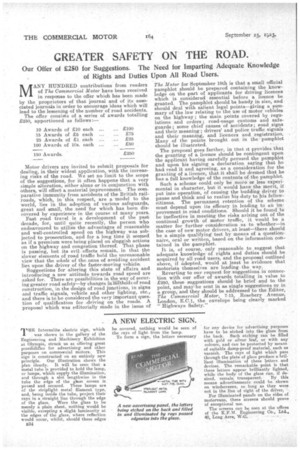GREATER SAFETY ON THE ROAD.
Page 18

If you've noticed an error in this article please click here to report it so we can fix it.
Our Offer of £250 for Suggestions. The Need for Imparting Adequate Knowledge of Rights and Duties Upon All Road Users.
MANY HUNDRED contributions from readers of The Commercial Motor have been received in response to the offer which has been made by the proprietors of that journal and of its associated journals in order to encourage ideas which will lead to the lessening of the number of road accidents.
The offer consists of a series of awards totalling £250, apportioned as follows :
Motor drivers are invited to submit proposals for dealing, in their widest application, with the increasing risks of the road. We set no limit to the scope of the suggestions, for it often happens that a very simple alteration, either alone or in conjunction with others, will effect a material improvement. The comparative immunity from accidents of the British railroads, which, in this respect, are a model to the world, lies in the adoption of various safeguards, great and small, the need for which has been discovered by experience in the course of many years. Fast road travel is a development of the past decade, for, until quite recently, the person who endeavoured to utilize the advantages of reasonable and well-controlled speed on the highway was subjected to prosecution, and for a long time it seemed as if a premium were being placed on sluggish actions on the highway and congestion thereof. That phase is passing, but its evil effects remain, in that the slower elements of road traffic hold the unreasonable view that the whole of the onus of avoiding accident lies upon the driver of the faster-moving vehicle.
Suggestions for altering this state of affairs and introducing a new attitude towards road speed are asked for. There are possibilities in the way of securing greater road safety—by changes inniEthdds of road construction, in the design of road junctions, in signs and traffic signals, vehicle and other lighting, etc., and there is to be considered the very important question of qualification for ,driving on the roads. A proposal which was editorially niade in the issue of
The Motor for September 18th is that a small official pamphlet should be prepared containing the knowledge on the part of applicants for driving licences which is considered essential before a licence be granted. The pamphlet should be handy in size, and should deal with salient legal points—giving a summary of the law relating to the use of motor vehicles on the highway ; the main points covered by regulations and orders ; road-usage customs and safeguards ; some chief causes of accidents; road signs and their meaning ; drivers' and police traffic signals and their meaning, and licences and registration. Many of the points brought out in the pamphlet should be illustrated.
The proposal goes farther, in that it provides that the granting of a licence should be contingent upon the applicant having carefully perused the pamphlet and upon his signing a declaration saying that he had read it and, agreeing, as a consideration for the granting of a licence, that it shall be deemed that he has a full knowledge of the contents of the pamphlet.
Such a scheme could only be more or less experimental in character, but it would have the merit, if put into operation, of causing the budding driver to pause and think and to realize his duty to his fellowcitizens. The permanent retention of the scheme must depend upon its efficacy in leading to an improvement in road conditions. Should it be found to be ineffective in meeting the risks arising out of the continual growth of motor traffic, it would be a matter for further consideration as to whether—in the case of new motor drivers,, at least—there should be a simple qualifying test by means of a questionnaire, oral or written, based on the information con, tained in the pamphlet.
It is, of course, only reasonable to suggest that adequate knowledge of rights and duties should be acquired by all road users, and the proposal outlined above, if adopted, would at least be evidence that motorists themselves are leading the way.
Reverting to our request for suggestions in connection with our offer of awards totalling in value to £250, these suggestions should be brief and to the point, and maybe sent in as single suggestions or in a group, and they should be addressed to the Editor, The Commercial Motor, 7-15, Rosebery Avenue, London, E.C.1, the envelope being clearly marked " Highways Safety."






























